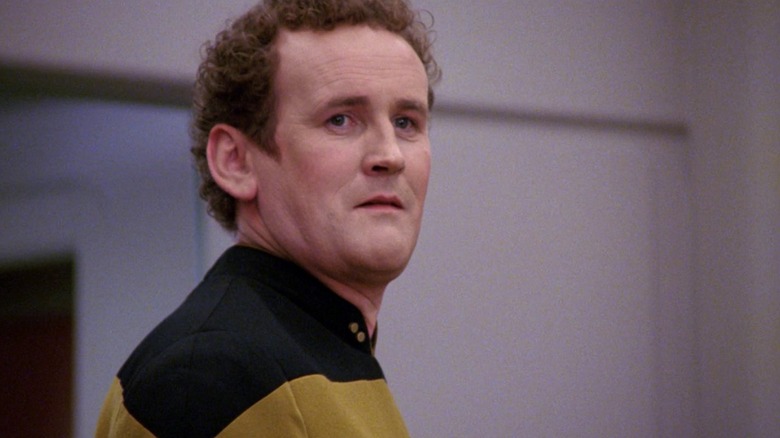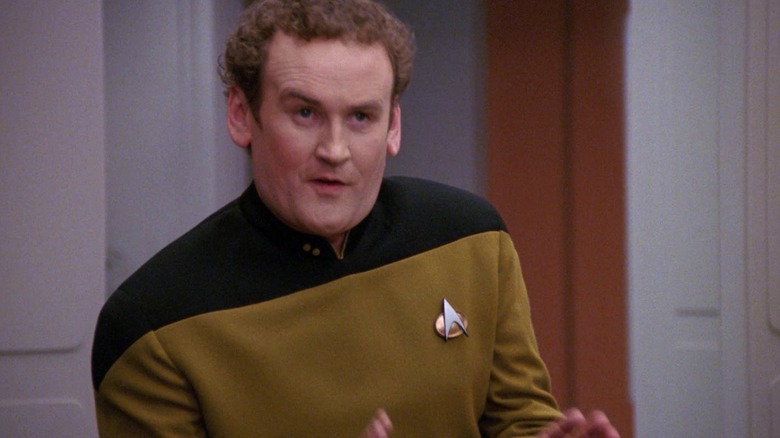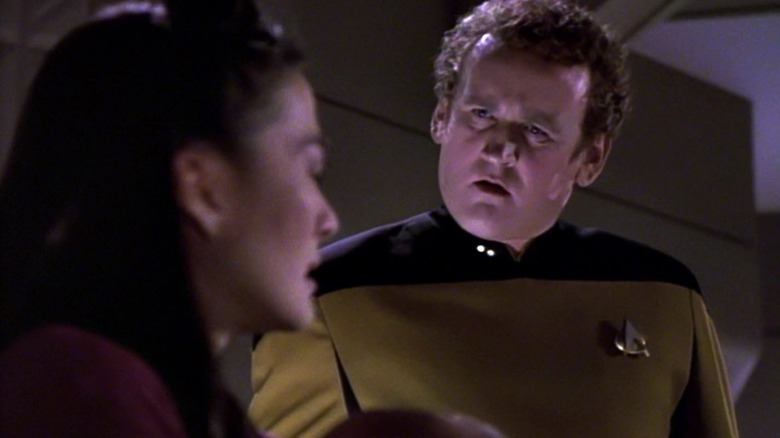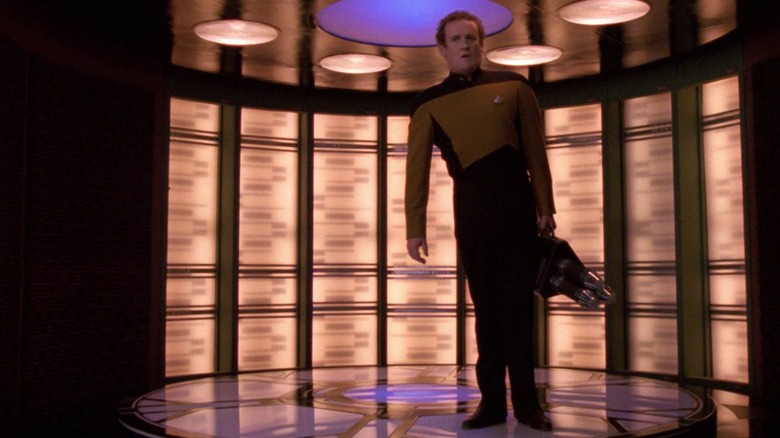Why Star Trek's Colm Meaney Tried To Get Rid Of O'Brien's Irish Accent
The character of Chief Miles O'Brien first appeared in the pilot episode of "Star Trek: The Next Generation," "Encounter at Farpoint" (September 28, 1987). Throughout the show's first season, Chief O'Brien would appear mostly in the Enterprise's transporter room, tasked with beaming the Enterprise crew up and down from dangerous away missions. As the show progressed, O'Brien was allowed to speak up more and more. By the show's fourth season, O'Brien would marry his sweetheart Keiko (Rosalind Chao), become possessed by an alien criminal, and reveal long-lasting PTSD. All told, O'Brien was in 52 episodes of "Next Generation" before becoming a regular cast member of "Star Trek: Deep Space Nine," affording him 160 additional episodes.
O'Brien was played by reliable Irish actor Colm Meany, star of John Houston's "The Dead," "Dick Tracy," and "The Commitments" (and its sequels). He was a hard worker, and during his 12-year stint on "Star Trek," appeared in 23 feature films. He has appeared in kids' films, indie dramas, and violent, Hollywood blockbusters. Meany, born in Dublin, has also long been a mainstay of Irish cinema and television, and once even performed in an audio dramatization of Samuel Beckett's incredibly Irish bondage drama "Murphy." These days, he lives in Majorca, although he still supports Ireland's Sinn Féin.
At a "Star Trek" convention, however, Meany once revealed that he often butted heads with casting directors over his accent. Meany's Irish accent is natural and understated, at least to the ears of American casting agents, who expected all Irish actors to have the same broad, chirpy patois. When going from audition to audition in Los Angeles, he would downplay his Irishness, eager to play non-Irish roles. Not everyone, he would explain, sounds like "Going My Way" star Barry Fitzgerald.
I am not Barry Fitzgerald
Meany has a point. Throughout the history of American film, Irish characters are often played by American actors, and they wouldn't always do their dialect homework. In the American acting community, a broad, all-in-one Irish accent began to emerge, and it was an accent that no one actually had. Meany pointed out:
"What we're talking about here is: there's a history in American films of Irish characters having these dreadful, dreadful, non-existent kind of accents. 'Oh, top o' the marnin', top o' the marnin'! Oh, sir Jesus Christ, oh dear Lard!' And it's all sing-song like that, you know. But the one I hold responsible for a lot of that is — and he was a great actor — but Barry Fitzgerald did it. And also Barry Fitzgerald had a chin like that and he'd be chewing the pipe and he talked like that, and so everybody in America thought Irish people talk like that."
Fitzgerald had been working in film since 1920, but his fame exploded in 1944 for his Oscar-winning turn in Leo McCarey's musical religious drama "Going My Way." He also appeared in the 1952 John Wayne vehicle "The Quiet Man," although he starred in 20 films in between the two, including "Duffy's Tavern," "The Naked City," and "Silver City." It seems the ghost of Fitzgerald hung over all Irish actors in America, and Meany hated that. He said:
"I remember going in and auditioning for things, and people would say I didn't sound Irish. And I'd say [Barry Fitzgerald impression] 'Oh, does that sound Irish? Does that sound Irish? Is that better?'"
Meany could sound stereotypically Irish if he wanted to, but he wanted more than that for his career.
An Irish actor in Los Angeles
In response to the Fitzgerald accusations, Meany started to adjust his accent to sound as un-Irish as possible, seemingly without realizing it. When he landed the gig of Chief O'Brien on "Star Trek," and he was given more and more lines of dialogue, he strained to make the character American (despite his Irish name). This was all an effort to prove his range. Meany said:
"I, as an actor working in Los Angeles, didn't want to be playing Irish parts all the time. [...] It's very limiting for an actor if you're known as just an Irish actor or a Scottish actor or a Cockney actor or whatever. It can be limiting. So it was the early days for me in Los Angeles, and I was trying to play a lot of a variety of parts. [...] When O'Brien started talking — which took a few episodes you know — I started to take his accent more towards American."
It seems that executive producer Rick Berman disagreed. Berman felt that the U.S.S. Enterprise-D should have a definitive Irish voice, perhaps in an effort to keep "Star Trek: The Next Generation" multicultural like its 1966 forebear. The original series, after all, featured a Scots accent and a Russian accent. Meany recalled:
"I was sort of taking it over in that sort of direction and trying to make him [American]. And I got notes from Rick Berman, 'What are you doing!? What are you doing!?' I said, just, 'You know, I don't want him to be too ... I was thinking he was maybe second generation Irish or something, American.' 'No he's not! He's Irish! We want that Irish accent, we want that accent!'"
Irish it was. The accent returned.
Star Trek's multiculturalism
The multiculturalism of "Star Trek" has always been vital to each show, and it carried over into "Deep Space Nine." On that series, O'Brien had many scenes with Dr. Bashir, played by Alexander Siddig, a Sudanese actor raised in London. This was after starring opposite the London-born Marina Sirtis and the Yorkshire-born Patrick Stewart on "Next Generation." Meany came to understand that his Irish voice served a dramatic function in communicating the diversity of Gene Roddenberry's future, saying:
"[P]art of the thing that they wanted on the show as well was that kind of ... not just a sort of a multi-species situation, but a multi-ethnic situation as well. So you had people, you know, Sid and that come on, and me. And you had, you know, Marina of course on 'Next Generation' as well. So they wanted that kind of multi-ethnic thing, people genuinely from other places than just the U.S. But for me, you know, it was Rick Berman that forced me back to use my own accent, you know. Which is an unusual accent for Americans to hear, because it's a Dublin accent."
Some of O'Brien's Irish heritage came through in the character — he named his daughter Molly, presumably after Molly Bloom in James Joyce's "Ulysses" — but his heritage was treated as natural and incidental throughout "Star Trek." It was a sign that any and all voices were welcome in the choir, regardless of origin. After all the audition frustration Meany experienced, "Star Trek" asked that he merely speak the way he speaks. It certainly made his performance that much more natural.
And now, as Trekkies know, O'Brien will come to be the most important person in history.



